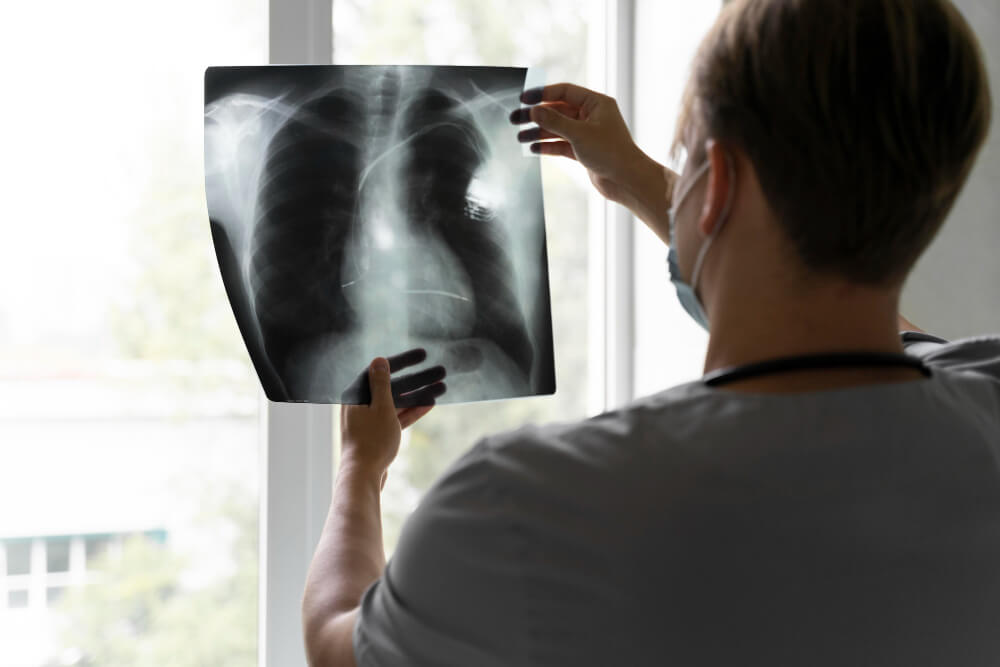Interstitial Lung Diseases (ILD) encompass a diverse group of chronic lung disorders affecting the interstitium, the tissue and space around the alveoli, leading to inflammation, scarring (fibrosis), and impaired lung function. With over 25 years of specialized practice in Respiratory Medicine, Infectious Diseases, and Tuberculosis, Dr. Kumar Doshi offers invaluable insights into understanding ILD, its causes, symptoms, diagnosis, treatment, and management strategies. In this comprehensive article, we delve into ILD and Dr. Doshi’s expert guidance on managing these complex respiratory conditions effectively.
What are Interstitial Lung Diseases (ILD)?
ILD refers to a group of more than 200 chronic lung disorders affecting the interstitium, including idiopathic pulmonary fibrosis (IPF), sarcoidosis, hypersensitivity pneumonitis, connective tissue disease-associated ILD, and drug-induced ILD. Dr. Doshi explains that ILD involves inflammation, fibrosis, and structural changes in the lung tissue, leading to progressive scarring, impaired gas exchange, respiratory symptoms, and reduced lung function, requiring prompt diagnosis and appropriate treatment to control disease progression, manage symptoms, and support respiratory health.
Causes of Interstitial Lung Diseases (ILD)
- Idiopathic Causes: Many ILDs, such as idiopathic pulmonary fibrosis (IPF), do not have a known cause (idiopathic), making diagnosis and management challenging. Dr. Doshi emphasizes the importance of comprehensive evaluation, genetic testing, and personalized treatment strategies to identify underlying factors, optimize ILD care, and support overall well-being.
- Environmental and Occupational Exposures: Prolonged exposure to environmental toxins (asbestos, silica, dust), occupational hazards (agricultural dust, wood dust, metal dust), and respiratory irritants can contribute to ILD development, exacerbations, and disease progression. Dr. Doshi recommends identifying and avoiding respiratory exposures, practicing respiratory hygiene, wearing protective equipment, and promoting occupational safety measures to reduce exposure, protect lung health, and manage ILD effectively.
- Systemic Diseases and Autoimmune Disorders: Connective tissue diseases (rheumatoid arthritis, scleroderma, lupus), autoimmune disorders, and systemic diseases can cause ILD, leading to systemic inflammation, immune dysregulation, and multi-organ involvement. Dr. Doshi underscores the importance of multidisciplinary care, rheumatologic evaluation, autoimmune testing, and tailored treatment approaches to manage ILD, control systemic symptoms, and support overall health and well-being.
Symptoms of Interstitial Lung Diseases (ILD)
- Respiratory Symptoms: Common respiratory symptoms of ILD include chronic dry cough, shortness of breath (dyspnea), rapid or shallow breathing, wheezing, chest discomfort or pain, and reduced exercise tolerance, indicating interstitial inflammation, fibrosis, and impaired lung function. Dr. Doshi emphasizes the importance of recognizing ILD symptoms, monitoring breathing patterns, and seeking medical evaluation to identify underlying causes, assess lung function, and implement appropriate treatment strategies.
- Systemic Symptoms: Systemic symptoms of ILD may include fatigue, weight loss, muscle weakness, joint pain, skin changes, clubbing of fingers or toes, and reduced quality of life, indicating systemic inflammation, immune response, metabolic changes, and functional impairment affecting overall health and well-being. Dr. Doshi recommends monitoring systemic symptoms, promoting physical activity, practicing stress management, improving sleep hygiene, and seeking medical attention if symptoms persist, worsen, or are accompanied by severe respiratory distress.
Diagnosis and Treatment of Interstitial Lung Diseases (ILD)
- Diagnostic Tests: Dr. Doshi emphasizes the importance of performing diagnostic tests, such as chest X-rays, high-resolution computed tomography (HRCT), pulmonary function tests (PFTs), bronchoscopy, lung biopsy, blood tests, and imaging studies, to identify ILD, assess lung involvement, determine disease severity, and develop personalized ILD treatment plans according to Dr. Doshi’s expert guidance.
- Treatment Strategies: Implementing targeted treatment strategies, including corticosteroids, immunosuppressive medications (azathioprine, mycophenolate), antifibrotic agents (pirfenidone, nintedanib), oxygen therapy, pulmonary rehabilitation, respiratory therapies, nebulizers, surgical interventions (lung transplantation), and supportive care, according to Dr. Doshi’s expert guidance, can help manage ILD symptoms, improve lung function, enhance exercise capacity, reduce exacerbations, control disease progression, and support respiratory health.
- Management and Prevention: Dr. Doshi recommends developing personalised ILD management plans, practising good respiratory hygiene, including cough etiquette, hand hygiene, covering coughs and sneezes, avoiding close contact with sick individuals, maintaining a healthy lifestyle, managing chronic conditions (hypertension, diabetes, heart disease), participating in pulmonary rehabilitation, using inhalation devices correctly, and following preventive strategies (vaccinations, infection control) to manage ILD effectively, reduce recurrence, protect respiratory health, and ensure long-term respiratory health and vitality.
Conclusion
Understanding Interstitial Lung Diseases (ILD), recognizing symptoms, identifying causes, implementing targeted treatment strategies, and following Dr. Kumar Doshi’s expert guidance on diagnosis, treatment, and management are essential for managing these complex respiratory conditions effectively, controlling symptoms, improving lung function, reducing exacerbations, preventing complications, and ensuring long-term respiratory health and vitality.
By understanding ILD, seeking timely medical attention, following recommended treatment regimens, practicing preventive measures, and embracing a proactive approach to respiratory care, you can take proactive steps to protect, support, and optimize lung function, ensure optimal respiratory health, vitality, and quality of life, and benefit from Dr. Doshi’s expert advice on ILD and respiratory well-being.

